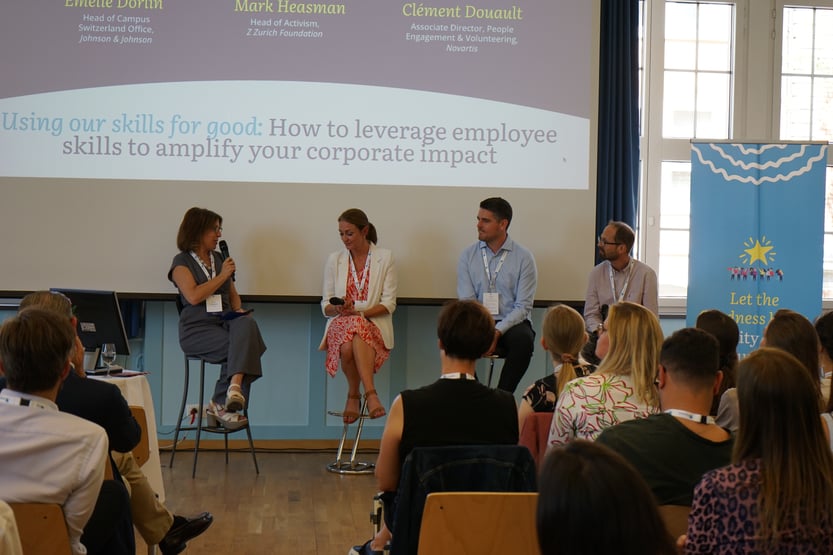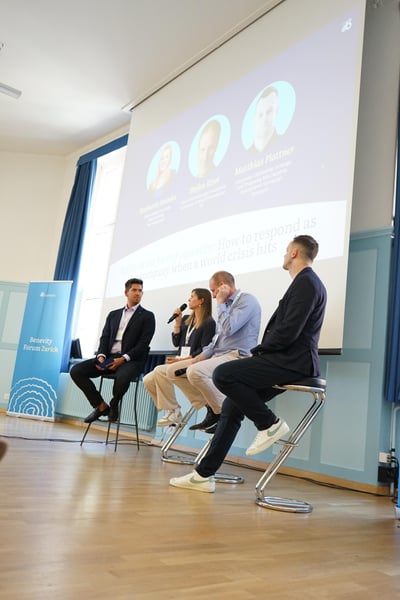Skills-based volunteering: Empowering communities through expertise

Volunteering has long been recognised as a powerful way to give back to the community and make a difference in the lives of others. However, traditional volunteering often involves providing general assistance and support, without necessarily leveraging specific skills and expertise. Skills-based volunteering, on the other hand, takes a more targeted approach by matching individuals' professional skills with the specific needs of nonprofit organisations. This approach allows volunteers to make a more significant impact and contribute their expertise in a meaningful way.
Together with Emelie Dorlin, Head of Campus Switzerland Office at Johnson & Johnson, Mark Heasman, Head of Activism at Z Zurich Foundation and Clément Dornault, Associate Director, People Engagement & Volunteering at Novartis, we took an in-depth look at the opportunities and challenges of skills-based volunteering.
Enhancing community impact
Johnson & Johnson (J&J), a global leader in healthcare, places a strong emphasis on societal impact. Their global employee engagement programme "Talent for Good" inspires its employees to use their unique skills and expertise to serve people and communities in need. Through customised volunteering commitments and opportunities, employees transform into global changemakers for good.
As Emelie explained during the panel discussion, one of the key programmes offered within J&J’s Talent for Good strategy is a skills-based volunteering programme called the "Global Secondment Programme". This programme allows selected employees to support partner organisations working on the front lines of health for a period of four to six months, time spent ranging from 20% to 100%. Through this programme, J&J employees are empowered to step out of their regular roles and contribute their talent and expertise directly to the needs of a partner organisation. Emelie emphasised that while not everyone can participate in long-term assignments, Talent for Good also provides other opportunities, such as the "Talent for Healthy Communities Programme", a virtual or hybrid skills-based team volunteering programme which lasts for 12 weeks with 20% time spent.
Similarly, The Zurich Insurance, with a global presence in over 60 countries, focuses on generating a wider response from employees and other stakeholders through their "My Impact" programme that has a focus on three pillars: mental health, climate change, and social equity. Mark highlighted the importance of leveraging their employees' skills in risk management, as well as other areas across the organisation. He emphasised the need for quality over quantity in skills-based volunteering, ensuring that the engagement provides real value to the nonprofit organisations involved.
Skills-based volunteering is the way we engage employees at all levels of the organisation.
Mark Heasman, Head of Activism at Z Zurich Foundation
He also mentioned the importance of being flexible and creative and offering employees at least one day for volunteering. To enhance skills-based volunteering, at Zurich they recently changed their approach, allowing ten hours for volunteering rather than a single day, showing the flexibility of the volunteering opportunities that they offer. But, according to Mark, it is important to clarify for everyone including managers, that skills-based volunteering is not a holiday. He underlines that with an example: “One of our employees told us that after he had been to Peru for six weeks as a part of our programme, the first thing his manager said was ‘how was your holiday?’, and that is certainly not the way it should be!”

Clément from Novartis, one of the world’s leading medicine companies, further outlined their partner-driven approach to skills-based volunteering. Novartis aims to address social impact by partnering with communities and listening to their needs. Their skills-based volunteering interventions are designed to build long-term relationships and sustainability, empower local communities, and promote employee giving. Clément believes that putting partners at the centre of the conversation and understanding their challenges is crucial in creating impactful projects.
Everything we do is partner-need driven. We are here to listen to society. And as a programme, as professionals, as a company, we really put our partners at the centre of everything we do.
Clément Dornault, Associate Director, People Engagement & Volunteering at Novartis
The value of skills-based volunteering
Skills-based volunteering creates a virtuous cycle of value for both organisations and communities. For Johnson & Johnson, community impact is not only a responsibility but also an opportunity to empower employees. Emelie Dorlin explains, "Skills-based volunteering nurtures a strong sense of purpose among our employees, motivating them to make a positive impact on society."
 At Z Zurich Foundation, Mark emphasised that skills-based volunteering offers a unique platform for talent development. By engaging in board service and continuous involvement in NGO projects, employees gain invaluable experiences that enhance their leadership and management skills. In addition, skills-based volunteering is a great way to amplify impact. “We did the maths: if every single employee in Zurich would take their day allowance, that would more than double our impact numbers. So the business case is really, really clear,” Mark said.
At Z Zurich Foundation, Mark emphasised that skills-based volunteering offers a unique platform for talent development. By engaging in board service and continuous involvement in NGO projects, employees gain invaluable experiences that enhance their leadership and management skills. In addition, skills-based volunteering is a great way to amplify impact. “We did the maths: if every single employee in Zurich would take their day allowance, that would more than double our impact numbers. So the business case is really, really clear,” Mark said.
Clément from Novartis highlights the long-term value of skills-based volunteering in terms of networking, skill development, and personal growth. By actively participating in projects aligned with their expertise, employees broaden their professional networks and gain exposure to different challenges, nurturing a spirit of innovation and collaboration. Clément also mentions the advantages for NGOs: “To give you an example, every company has a legal counsel. Imagine the difference between sending them to do a beach cleanup or actually letting them help the nonprofit. Think about the power of these people.”
Measuring the impact of skills-based volunteering
Measuring the impact of skills-based volunteering presents its own set of challenges. At Zurich Insurance, impact measurement encompasses both the direct outcomes achieved to address community challenges and the personal development of employees. Mark pointed out the importance of qualitative evaluations that capture employees' growth, skill enhancement, and satisfaction.
Emelie believes it is essential to assess the outcomes from the perspective of the nonprofit organisation. By understanding their needs and measuring the tangible benefits they derive from the volunteer's expertise, companies can validate the impact created.
I think as companies, it's on us to listen. It's on the partner organisation to define their needs. By sharing our skills, expertise and talent, we can help support and strengthen our partners' organisational capacity and, as such, contribute to raising public health standards.
Emelie Dorlin, Head of Campus Switzerland Office at Johnson & Johnson
Novartis views impact measurement as an interactive process that involves ongoing dialogue with partners and communities. Their giving and volunteering programmes report based on the I-O-O-I framework, considering input, output, outcome and impact to facilitate the exchange with different stakeholders and ensure relevance, consistency and comparability in the impact results.
On a global level, they focus on two areas: impact valuation and assessing their contribution to the UN Sustainable Development Goals (SDGs). Novartis is also pioneering an approach called social, environmental and economic (SEE) impact valuation that aims to show the positive impact they bring to countries, health systems and individuals, balanced by the negative impact of their operations on the environment and other areas.
Overall, skills-based volunteering offers a unique opportunity for individuals and corporations to make a significant impact by utilizing their professional expertise. By aligning their skills with the needs of nonprofit organisations, volunteers can contribute in a meaningful way and create positive change in their communities. As more organisations embrace skills-based volunteering and leverage their employees' expertise, the potential for social impact and transformative change continues to grow.
Keeping a pulse on future CSR and ESG trends
At our Benevity Forum in Zurich, we saw once again how important it is to exchange views on new trends in CSR and ESG and how helpful the conversation with other companies can be. To keep track of the latest trends and developments, you can always take a look at our resources, where we share exciting articles, guides and e-books on the topics of CSR and ESG for you.
